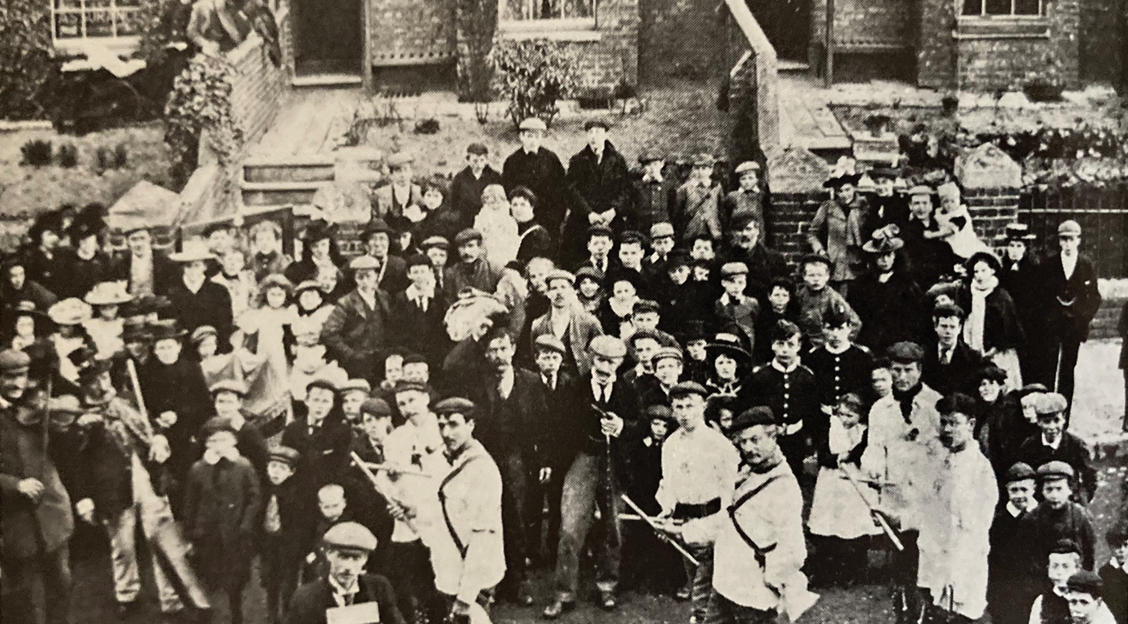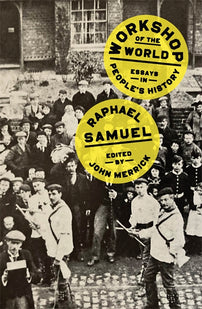All departments of human activity
Raphael Samuel grapples with the idea of a ‘people’s history’ in this excerpt from Workshop of the World.

People’s history today is characteristically used to denote a history which is local in scale, taking as its subject the region, the township or the parish: in the case of the city, the morphology of the individual quarter or suburb, or even of the individual house and street. In the past, however, it was more concerned with the broad lines of national development. ‘Whatever value this book may have’, writes A. L. Morton in his preface to The People’s History of England – a Marxist work, first published by the Left Book Club in 1938 – ‘must be rather in the interpretation than in the novelty of the facts it presents ... It sets out to give the reader a general idea of the main lines of the movement of our history.’ Much the same might be said of J. R. Green’s Short History which takes its start from the ‘peasant commonwealths’ of Anglo-Saxon times, and moves in measured sweep across the centuries. Similarly Michelet, in his populist histories as in the profiles he wrote of his time (Tableau de France and Le Peuple), was concerned with the great collective forces shaping the destiny of the French nation.
He was interested in events as illustrations of underlying social processes, in individuals as representatives of movements and groups. His whole notion of society was that of an organic historically derived unity, and he saw the task of people’s history as that of covering all departments of human activity, following (as he wrote) industry and religion, law and art, as interrelated threads.
The practitioners of what was called in Germany ‘Kulturgeschichte’ (cultural history), and in other countries historical anthropology, cultural sociology, or the history of ‘civilisation’, worked on an even longer timespan. Their subject matter was nothing less than universal history, whether in the sphere of material culture, mass psychology, or popular religion. They were concerned to seek out a linear path of development, delving into the recesses of pre-history, and tracing the evolution of humanity through savagery and barbarism to civilisation. This was the version of people’s history that was most highly regarded in the Plebs League, as can be seen from the Ruskin student paper on ‘Worker-historians in the 1920s’. It offered a captivating sense of totality – ‘not a partial history of facts ... but an attempt ... to understand how history worked’. Müller-Lyer’s History of Social Development (translated into English in 1920) was a favourite text, the work of a disciple of Lamprecht. He believed that everything, from the evolution of tools to the rise of romantic love, could be reduced to world-wide uniformities: divergences were largely accidental or of a purely local character. The worker-historians of the 1910s and 1920s followed suit, and their histories – ‘outline’ histories such as Mark Starr’s A Worker Looks at History – were global in scale and universal in their timespan, following the trajectory indicated by Engels, and exploring the origins of family, class, and state.
The main thrust of people’s history in recent years has been towards the recovery of subjective experience. One might note, in oral history, the overwhelming interest in reconstituting the small details of everyday life; in local history, the shift from ‘places’ to ‘faces’, from topographical peculiarities to the quality of life; in labour history, the preoccupation with the more spontaneous forms of resistance. More generally one could note the enormous research ingenuity which has gone into attempting to capture the voice of the past – the cadences of vernacular speech, the tell-tale turns of phrase which can be gleaned from court records or anonymous letters. As in hermeneutics, the major effort is to present historical issues as they appeared to the actors at the time; to personalise the workings of large historical forces; to draw on contemporary vocabularies; to identify the faces in the crowd. Seventy or eighty years ago, by contrast the whole attention of people’s history was turned on the working of impersonal historical forces, located by some in climate and geography, others in tools and technology, by yet others in biological necessity. Its leading feature was a kind of multi-layered determinism in which contingency could be disregarded while necessity ruled in its stead. History was conceived as an orderly, logical development, an inevitable passage from lower to higher stages. In a conspectus like this, there was little patience for the small details of everyday life. As a Welsh miner told the Ruskin students: ‘we weren’t interested in whether so-and-so had sugar in his coffee or not. What interested us was how and why societies change.’
This version of people’s history invoked the authority of Marx, but it borrowed freely from the positivist sociology of Spencer and Comte as also, in another direction, from Darwinian biology. Folk-life studies in this period were conducted in the same spirit using the comparative method to situate myths in an evolutionary grid. The deterministic vision is no less apparent in the ‘folk psychology’ of Wundt – a kind of historical ethnography of mental characteristics and in those various theories of mass behaviour which make the individual a compulsive creature of instinct. The most deterministic history of all was that of human geography, which explained the character of peoples by reference to geography, climate, and soil.
—An edited excerpt from Workshop of the World: Essays in People's History by Raphael Samuel, edited by John Merrick
[book-strip index="1" style="buy"]
